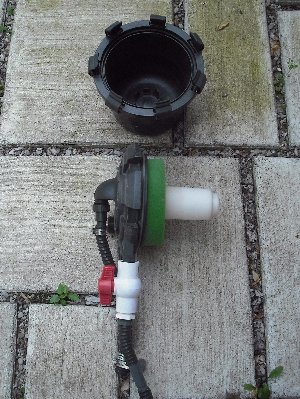Mechanical pond filters. Biological pond filters. Chemical pond filtration |
TIPS
- Like any other kind of physical filtration, the filter must be cleaned or replaced frequently. You should plan to clean out your filter once a week.
- Add new fish gradually. Go too fast and the filter cannot keep up with the rapid increase of ammonia levels.
- The larger the fish, the more ammonia and waste they produce and your filter may have trouble keeping up. Plan ahead when choosing a filtration system for your pond.
|
Myth
Koi are no harder to keep than goldfish, they just require more area per fish and can be a bit messier than goldfish. Remember, Koi keep growing regardless the size of the pond. |
|
Mechanical pond filters. Biological pond filters. Chemical pond filtration
.
WARNING
Inadequate filtration can lead to dangerous buildups of harmful chemicals such as ammonia and nitrites, which can injure or even kill your fish. |
|
| Pond Filters |
|
|
Mechanical pond filters. Biological pond filters. Chemical pond filtration.
Environmental friendly method
Natural ponds have a buildt-in filter system. Usually the ponds are much larger than the average backyard pond and biological filtration is provided by the bacteria in the soil on the bottom of the pond. Those conditions do not exist in lined and preformed backyard ponds. We have to provide filtration by installing a biological or mechanical filter. Chemical pond filtration or a chemical free, environmentally friendly, method of filtration are two other options.
Biological pond filters
These filters use bacteria that feed on and break down harmful chemicals in the pond and convert them to harmless chemicals.
Mechanical pond filters
Mechanical filters remove physical impurities, such as blown in debris and solid waste, from the water.
Chemical pond filtration
Carbons and resins are used to remove organic and inorganic pollutants from the pond water. A brown tinge from dissolved organic compounds, or a greenish hue from free-floating algae are indications of high levels of ammonia. Adding the right chemicals to the pond filter will lower the level of ammonia
Environmental friendly method
This method is not practical for smaller lined or pre-formed ponds. Pond owners opposing the use of chemicals can filtrate the environmentally friendly way. Instead of using chemically based algaecides the pond is lined with barley straw or barley extract is added to the water. |
 Mechanical filter
Mechanical filter
Cleaned and ready to go for another season
|
|
|
|